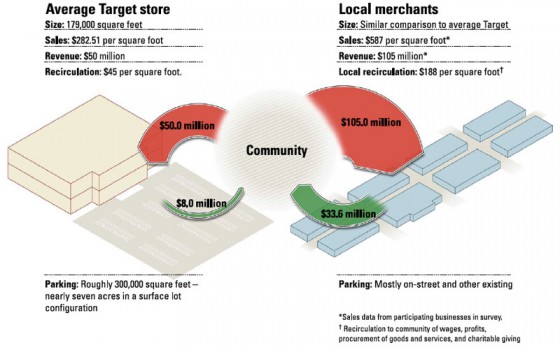Locals have 4x economic impact over nationals

How much of a greater impact do local retailers have on nationals? The Urban Conservancy recently completed a study with Civic Economics to answer just that, called Thinking Outside the Box: A Report on Independent Merchants and the New Orleans Economy. Keep in mind this is just economics, and not considering the cultural impact on the local neighborhood.
According to the study, when compared to leading chain competitors on a per square foot basis, local retailers:
– generate twice the annual sales;
– recirculate revenue within the local economy at twice the rate;
– have four times the economic impact in terms of wages, profits, procurement of goods and services, and charitable giving.
The study was actually a result of looking at two popular approaches to redevelopment for New Orleans:
1. The urban model involves the restoration and rejuvenation of existing commercial corridors.
2. The suburban model requires the development of large-format retail on large parcels, anchored by general merchandise and home improvement warehouses augmented by a mix of junior anchor and small in-line spaces.
See the urban and suburban development types here.
Another conclusion of the study: If New Orleans consumers were to shift 10% of all retail activity from chains to locals, the result would be the equivalent of injecting an additional $60 million annually into the local economy in the form of recirculated dollars that would otherwise have left the area, and $235 million regionally.

i’d say this is very interesting, of course, but it’s _very_ difficult for me to believe, at first glance, that local businesses (using the space comparison, above) do even 1/10th of a Target store (or other big box), much less _twice_ as much.
But, I’ll read the report and try to keep an open mind. If it’s true, that’s a great thing.
This is a per square foot comparison. The comparison is also between a successful big box store, and a successful main street (Magazine Street). Our local coffeehouse, Tryst in Adams Morgan, Washington DC seems to do twice the business of the Starbucks a block away, but that’s not what the study is about. However, I would think that would be even less expected.
We have anti-chain store laws here in SF, but it’s a bit frustrating for me to see so many people holding local merchants in such high regard. They’ve fought every piece of “good-cities” government that we’ve tried to implement — public plazas, bike lanes, carsharing, intelligent parking meters, Transit Oriented Development, Bus Rapid Transit, you name it… It’s all about “Parking, Parking, Parking!” They’d turn our century-old neighborhood into a strip mall if they ran the planning commission.
i’m a fan of the anti-chain store laws. corporations suck, and chains suck. if we get more democratic control of corporations and chains, then we can make the laws more restrictive.
and i don’t believe chain stores any better neighbors than small businesses. can you say, huge parking lots? and even if i don’t yet fully buy this report, i do believe small businesses turn over local money more effectively, generally speaking.
_and_ i think that the city and non-profit groups generally do a horrible job of doing education/outreach with small businesses, though we’re getting a lot better. small businesses are all about…staying in business, and even doing well — that means we have to show some respect for the fact that they live and work on these streets every day. too often we go in w/ the attitude that if we just tell them ‘how things are and are going to be’, then that’s justification enough and they should just shut up and do what we say. i’d be bent and resistant, too, if i was in their shoes. as i said, we’ve gotten better, but we still have a long way to go, especially w/ regards to big projects that tear up the streets — we need a ‘business protection program’ of sorts — there’s no reason we can’t do it — it’s just laziness on our part, in my opinion.
Interesting that they totally omitted the contributions to taxes and costs to cities, both at the store level and (pro-rate) at headquarter level. Target paved its parking lot upon which it pays annual property taxes; small businesses complain when the city puts parking meters in front of their shop (for which they free ride parting) or if the spot is eliminated to improve buses. Target offers health care; the local store employs part-timers an rarely offers health care. Target pays corporate taxes and its owners pay income taxes on the dividends it pays out; the local store has all sorts of tax breaks and doesn’t pay as much (on a %age of revenue basis).
I’m a committed urbanist, but believe in truth first.
Oh, and if